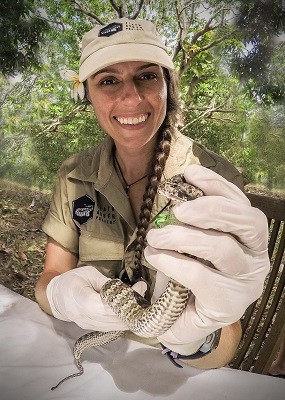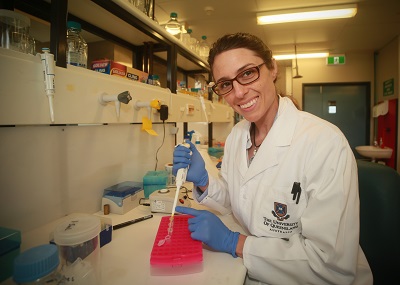
University of Queensland animal behaviour, snake and venom researcher Dr Christina Zdenek has landed a prized Australian Broadcasting Corporation media residency.
The ABC 2021 TOP 5 Science program rewards five of Australia’s best emerging science thinkers and communicators annually, offering a unique opportunity: a two-week residency with the ABC, equipping them with industry-leading media and communication skills.
Dr Zdenek said she was excited to promote a better understanding of snakes, their venom and behaviour.
“This phenomenal springboard will help me play a part in reducing people’s fear of snakes, and also reducing the human-snake conflict,” she said.
“I'd also like to share stories that promote Australian wildlife in general, and one story in particular that comes to mind: the issue of cats in Australia.
“So many endemic Australian species struggle to survive due to this introduced mega-predator, and multiple mammal species have already gone extinct due to cats.
“Yet, we all have a role to play in the solution – keep cats indoors, don't ever 'release' unwanted cats into the bush, spay or neuter your cat, and purchase orphaned cats rather than cats from breeders.
“Science communication regarding this issue is particularly important, and we need to communicate in a way that can tactfully alter people’s behaviour, so we can protect our unique and vulnerable Australian reptiles, mammals, and birds.”

The successful early-career scholars and practitioners were chosen from almost 400 applicants, with fellow science category recipients from institutions across the nation.
In late August, Dr Zdenek will undertake a two-week online (due to lockdowns) residency with ABC Radio National to learn the craft of communicating with a wide audience from some of Australia’s best broadcasters, and how to develop content across radio and digital platforms.
Dr Zdenek said the media landscape is ripe for more, and better, science communication.
“Now more than ever, I think the world clearly realises the importance of science to society,” Dr Zdenek said.
“And we have fantastic scientists in Australia – top tier – producing excellent and important research.
“However, in Australia we fall short in translating our brilliant research into society relative to other countries.
“Science communication plays the greatest role in filling this gap to translate research into practice, and after all, the public largely pays for the research, so the public should benefit from it too.
“I'm stoked to be invited to this intensive media residency program because I believe it will provide me the skills, know-how, and network to continue my long-standing, deep interest in science communication and bring it to the next level.
“In short, I want to learn from the best – being able to immerse myself among the top science communicators and media professionals in Australia will be such a privilege.
“I'll definitely be making the most of it!”
The fellow science category winners included Dr Amelie Meyer from the University of Tasmania, Dr David Gozzard from the University of Western Australia, Dr Mandy Hagstrom from the University of New South Wales and Dr Joshua Chu-Tan from the Australian National University.
For more information about Dr Christina Zdenek, visit her website or follow her on Instagram, Twitter or YouTube.
Media: Dominic Jarvis, science.media@uq.edu.au, +61 413 334 924.



